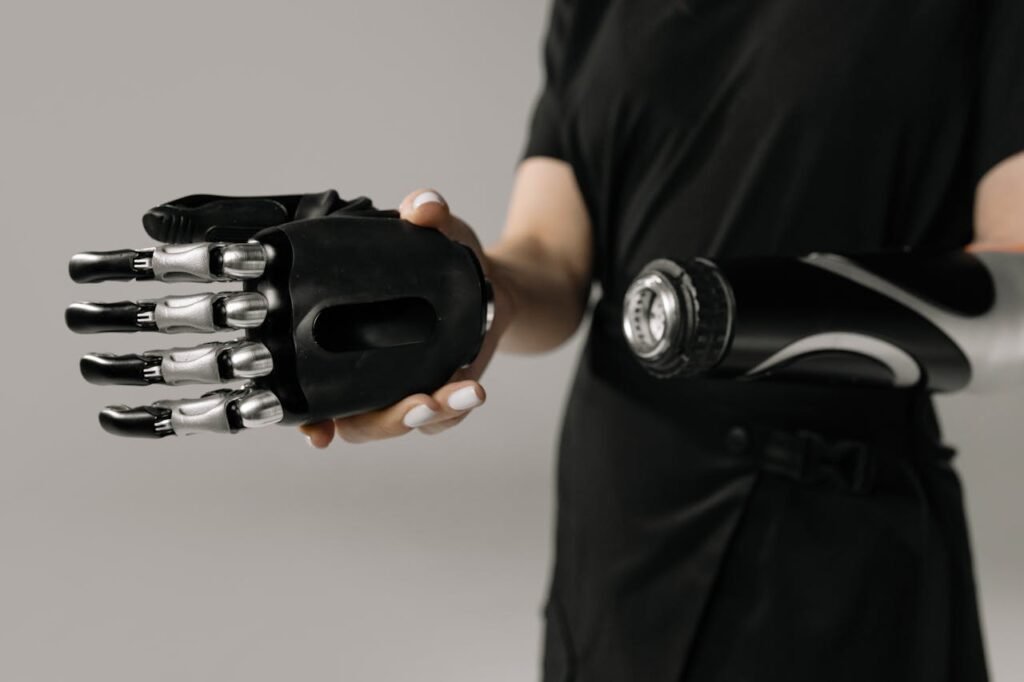Prosthetics have traditionally focused on replacing or restoring lost limbs, but the field has expanded far beyond its origins. Today, facial and cranial prosthetics represent a rapidly evolving area, bringing hope and functionality to individuals who have experienced trauma, illness, or congenital conditions affecting their faces and skulls. These prosthetics are not just about restoring appearance; they are about rebuilding confidence, improving functionality, and enabling individuals to reconnect with their lives.
With advancements in materials, technology, and personalization, facial and cranial prosthetics are reaching new levels of realism and usability. This article explores the latest trends in this transformative field, shedding light on how innovation is changing lives and offering actionable insights for businesses to stay ahead in this niche yet impactful market.
The Rise of Facial and Cranial Prosthetics
Facial and cranial prosthetics address complex challenges that go beyond physical reconstruction. They must replicate intricate features, match skin tones, and seamlessly integrate with the body’s unique contours. Unlike limb prosthetics, where functionality is often the primary goal, facial and cranial prosthetics must balance aesthetics, comfort, and usability.
Meeting the Surge in Demand
The growing demand for facial and cranial prosthetics stems from several factors. Advances in healthcare have improved survival rates for individuals experiencing trauma or undergoing surgery, leading to a higher number of people seeking reconstruction and rehabilitation.
At the same time, societal attitudes toward disfigurement are evolving, with an increasing emphasis on inclusivity and support for individuals with visible differences.
Businesses entering or expanding in this field must recognize the multifaceted nature of this demand. Users are not just looking for devices that restore their physical appearance—they are seeking solutions that feel natural, enhance their quality of life, and help them navigate social interactions confidently.
Companies that prioritize user-centric design and incorporate emotional and functional needs into their products will stand out in this growing market.
Redefining the Scope of Prosthetics
Unlike traditional prosthetics, which primarily focus on mobility, facial and cranial prosthetics encompass a broader range of objectives. They must address aesthetic concerns, restore sensory or structural functions, and accommodate unique anatomical and emotional needs.
For example, a facial prosthetic may need to help a user blink naturally, while a cranial prosthetic might protect the brain following surgery or injury.
This expanded scope challenges businesses to innovate continuously. Materials must mimic the look and feel of human tissue while remaining durable and hypoallergenic.
Technologies like 3D scanning and printing allow for precision and customization, ensuring that each prosthetic fits seamlessly with the user’s unique anatomy.
Companies that adopt these advancements can create products that meet the diverse needs of their users, establishing themselves as leaders in the field.
Addressing the Emotional Dimensions
The psychological impact of facial and cranial prosthetics cannot be overstated. Losing a part of one’s face or skull is not just a physical trauma; it is an emotional journey that affects self-perception, confidence, and relationships. Prosthetics that effectively address these emotional dimensions have the potential to transform lives.
Businesses must integrate this understanding into their approach. Providing prosthetics that are lifelike and comfortable is just the start.
Creating educational resources, peer support networks, and training programs for medical professionals ensures that users receive holistic care that goes beyond the device itself.

Materials Revolutionizing Facial and Cranial Prosthetics
The materials used in facial and cranial prosthetics are at the heart of their transformation. Early prosthetics were often rigid and uncomfortable, offering limited aesthetic appeal. Today, new materials are allowing for the creation of prosthetics that are lightweight, flexible, and lifelike.
Silicone and Its Role in Hyper-Realism
Silicone has emerged as a preferred material for facial prosthetics due to its ability to mimic the texture and elasticity of human skin. Advanced silicone formulations allow for detailed sculpting, capturing every nuance of the face, from fine wrinkles to natural translucency.
These prosthetics can be custom-tinted to match a user’s exact skin tone, ensuring a seamless appearance.
Silicone’s flexibility also makes it ideal for comfort. It conforms to the wearer’s anatomy, reducing irritation and allowing for extended use.
For businesses, investing in high-quality silicone and advanced coloration techniques is crucial for creating prosthetics that meet user expectations for realism and comfort.
Bio-Compatible Materials for Cranial Reconstruction
Cranial prosthetics often require materials that can integrate with the body’s natural structure. Bio-compatible materials like titanium and polyetheretherketone (PEEK) are increasingly used for cranial implants, offering strength and durability while minimizing the risk of rejection.
These materials are often used in combination with 3D printing to create customized cranial plates that fit precisely to the individual’s anatomy.

This combination of precision engineering and advanced materials is transforming outcomes for patients who require cranial reconstruction due to injury or surgery.
The Role of Technology in Customization
Technology plays a pivotal role in the design and fabrication of facial and cranial prosthetics, enabling unparalleled levels of personalization and precision. From 3D scanning to artificial intelligence, innovative tools are enhancing both the manufacturing process and the user experience.
3D Scanning for Accurate Fitting
One of the most significant advancements in prosthetic design is the use of 3D scanning technology. This non-invasive method captures precise measurements of the face or skull, creating a digital model that serves as the foundation for the prosthetic.
3D scanning eliminates the need for traditional molds, which can be uncomfortable and imprecise. The digital model ensures that the prosthetic fits perfectly, reducing the risk of discomfort and enhancing functionality.
For businesses, incorporating 3D scanning into their workflow not only improves accuracy but also streamlines production, saving time and resources.
3D Printing for Complex Designs
3D printing complements 3D scanning by allowing for the rapid production of highly detailed prosthetics. This technology is particularly valuable for cranial implants, where precise geometry is critical for structural integrity and patient safety.
For facial prosthetics, 3D printing enables the creation of intricate features, from the curve of a cheekbone to the subtle contours of an ear. It also allows for iterative design, making it easy to refine prototypes based on user feedback.
Businesses that invest in 3D printing technology can achieve greater flexibility and efficiency, meeting the unique needs of each user while maintaining scalability.
Artificial Intelligence and Predictive Modeling
Artificial intelligence is emerging as a powerful tool for designing prosthetics that are not only functional but also intuitive. Predictive modeling algorithms can analyze a user’s facial anatomy and movement patterns, guiding the design process to create prosthetics that integrate seamlessly with their natural expressions.
AI can also assist in simulating how different materials or designs will interact with the user’s skin, ensuring optimal comfort and durability. By leveraging AI, businesses can enhance both the design process and the end product, delivering prosthetics that feel as natural as they look.

The Psychological Impact of Facial and Cranial Prosthetics
While the physical functionality of facial and cranial prosthetics is paramount, their psychological impact is equally significant. Losing parts of the face or skull due to trauma, illness, or congenital conditions can deeply affect a person’s self-esteem, identity, and social interactions. These prosthetics offer more than physical restoration—they provide a pathway to emotional recovery and social reintegration.
Restoring Identity and Confidence
Facial features are central to how individuals perceive themselves and how others interact with them. For someone who has lost a part of their face, the absence can feel like the loss of identity. Facial prosthetics help bridge this gap, allowing users to regain a sense of normalcy and confidence in their appearance.
The ability to smile, frown, or make subtle expressions through a prosthetic restores emotional communication, helping users navigate social situations more comfortably.
Businesses that focus on enhancing the aesthetic and functional integration of their prosthetics can play a pivotal role in helping individuals rebuild their confidence and reclaim their lives.
Improving Social Interactions
Facial and cranial prosthetics also address the stigma associated with visible disfigurements. By providing users with realistic and well-fitting prosthetics, businesses can help them overcome barriers to social engagement.
These devices not only improve how others perceive the individual but also empower the user to participate in social, professional, and community activities without fear of judgment or misunderstanding.
For companies, emphasizing the emotional benefits of their products in marketing and outreach can resonate deeply with potential users. Sharing stories of individuals who have experienced transformative journeys with facial or cranial prosthetics can inspire trust and highlight the brand’s impact.
Innovations in Attachment and Integration
The effectiveness of facial and cranial prosthetics relies heavily on their attachment methods and how seamlessly they integrate with the user’s body. Recent advancements in this area are addressing long-standing challenges related to stability, comfort, and durability.
Magnetic Anchors for Stability
For facial prosthetics, magnetic attachment systems are becoming a preferred solution. These systems use small implants placed in the underlying bone to securely anchor the prosthetic, ensuring it stays in place during daily activities.
Magnets provide the dual benefits of stability and ease of removal, allowing users to maintain their prosthetics without difficulty.
Businesses investing in magnetic attachment technology can enhance user satisfaction by offering devices that are both secure and convenient. Highlighting the simplicity of these systems in user education materials can further reduce anxiety for new users.
Skin-Adhesive Solutions
In cases where surgical implantation is not an option, advanced skin adhesives offer an effective alternative. These adhesives are designed to be strong yet gentle on the skin, ensuring that the prosthetic stays in place without causing irritation.
Innovations in adhesive technology have made them more resistant to sweat, moisture, and environmental factors, increasing their reliability in everyday use.
For companies, providing users with high-quality adhesive options and detailed guidance on application can improve their experience and build trust in the product.
Expanding Accessibility Through Cost-Effective Solutions
One of the biggest challenges in facial and cranial prosthetics is accessibility. The complexity of these devices often makes them expensive, limiting their availability to a small segment of users. Businesses that prioritize affordability without compromising quality can expand their reach and make a meaningful impact on more lives.
Simplifying Production Processes
Advanced manufacturing techniques like 3D printing and modular design can significantly reduce production costs. By standardizing certain components while customizing others, businesses can create high-quality prosthetics that are both scalable and cost-effective.
For instance, cranial plates can be pre-fabricated in common sizes and shapes, with final adjustments made to fit the user’s specific anatomy. Similarly, facial prosthetics can use modular frameworks that are tailored with individualized surface details, combining efficiency with personalization.

Collaborating with Healthcare Providers
Partnerships with hospitals, clinics, and rehabilitation centers can help businesses streamline distribution and reach users who need these prosthetics most.
By offering training programs for medical professionals, companies can ensure that their products are fitted and maintained correctly, improving outcomes for users.
Government partnerships and subsidy programs can also play a key role in expanding access. Businesses that work with policymakers to develop funding initiatives for facial and cranial prosthetics can position themselves as leaders in the field while supporting social responsibility.
The Future of Facial and Cranial Prosthetics
The field of facial and cranial prosthetics is poised for continued innovation, with emerging technologies and materials promising even greater advancements. Businesses that stay at the forefront of these trends can shape the future of the industry while improving lives on a global scale.
Neural Integration for Enhanced Functionality
Research into neural interfaces is opening up possibilities for prosthetics that interact directly with the user’s nervous system. For facial prosthetics, this could mean devices that move in sync with natural muscle activity, enabling more expressive and functional features.
Cranial prosthetics integrated with neural sensors could support brain activity monitoring, adding a new dimension to their capabilities.
For businesses, investing in R&D for neural integration represents a long-term opportunity to offer groundbreaking solutions that redefine the potential of prosthetics. Collaborating with neuroscientists and technology firms can accelerate these developments.
Bioprinting and Regenerative Prosthetics
Bioprinting, which uses 3D printing technology to create living tissue, is an exciting frontier for facial and cranial reconstruction.
This technique could enable the creation of prosthetics that not only mimic natural features but also integrate with the user’s biology, potentially regenerating skin or bone over time.
While still in its experimental stages, bioprinting holds immense promise for the future of prosthetics. Businesses that explore this technology early can position themselves as pioneers in a transformative field.
Integrating Digital Technologies into Facial and Cranial Prosthetics
The integration of digital technologies into facial and cranial prosthetics is paving the way for unprecedented advancements in precision, personalization, and functionality. By combining cutting-edge software with hardware innovation, prosthetics are becoming smarter, more adaptive, and increasingly user-centric.
Augmented Reality for Design and Fitting
Augmented reality (AR) is emerging as a powerful tool in the design and fitting process for facial and cranial prosthetics. AR allows users and practitioners to visualize the prosthetic in real time, ensuring that it aligns perfectly with the user’s facial structure and aesthetic preferences before manufacturing begins.
For example, AR can project a digital model of the prosthetic onto the user’s face, allowing adjustments to be made instantly. This approach eliminates guesswork and enhances user satisfaction by providing a clear preview of the final product.
Businesses that adopt AR technology can streamline consultations, reduce production errors, and create a more engaging experience for their customers.

Smart Prosthetics with Embedded Sensors
Facial and cranial prosthetics are increasingly incorporating sensors that provide real-time feedback to users and healthcare providers. These sensors can monitor factors such as temperature, pressure, and movement, ensuring that the prosthetic remains comfortable and functional throughout daily use.
In cranial prosthetics, sensors can play a critical role in tracking recovery after surgery or trauma. For instance, sensors embedded in a cranial plate might monitor intracranial pressure, alerting doctors to potential complications.
Such features add immense value to the prosthetic, turning it into a tool for ongoing care and monitoring.
Sustainability in Facial and Cranial Prosthetics
As sustainability becomes a global priority, the prosthetics industry must also adapt. Facial and cranial prosthetics, like many medical devices, can have a significant environmental footprint due to the materials and processes involved in their production.
Businesses that prioritize sustainability can differentiate themselves in the market while aligning with the values of socially conscious consumers.
Eco-Friendly Materials and Manufacturing
Innovations in materials science are making it possible to produce prosthetics using biodegradable or recycled components. For instance, bioplastics derived from renewable sources can replace traditional polymers, reducing the environmental impact of production.
Similarly, using recycled metals for cranial plates can lower resource consumption without compromising quality.
Manufacturing processes such as additive manufacturing (3D printing) also contribute to sustainability by minimizing material waste. Businesses that adopt these methods not only reduce costs but also position themselves as environmentally responsible leaders in the industry.
Circular Economy Models
A circular economy approach involves designing prosthetics with reuse and recycling in mind. Businesses can create programs to collect and refurbish used prosthetics, extracting valuable materials for new devices. This approach reduces waste and extends the lifecycle of each component.
Offering trade-in programs or discounts for users who return their old prosthetics encourages participation in these initiatives, fostering a positive brand image while promoting sustainability.
Empowering Users Through Education
Education plays a vital role in ensuring that users of facial and cranial prosthetics can maximize the benefits of their devices. From understanding how to care for their prosthetic to learning about the latest innovations, informed users are more likely to have positive outcomes.
Comprehensive Training Programs
Users of facial and cranial prosthetics often require guidance on how to wear, maintain, and adjust their devices. Businesses can offer comprehensive training programs, both in person and online, to address these needs.
For example, instructional videos or interactive apps can demonstrate how to apply adhesives, clean the prosthetic, or troubleshoot common issues.
Training programs should also cater to healthcare providers, ensuring they are equipped to fit and maintain the prosthetics effectively. These efforts build trust and confidence in the product, fostering long-term loyalty among both users and medical professionals.

Community Engagement and Peer Support
Connecting users with others who have similar experiences can provide emotional support and practical advice. Businesses can create online forums, social media groups, or in-person events where users can share their stories, ask questions, and offer tips.
These communities not only empower users but also generate valuable feedback for the business. By listening to their customers, companies can identify areas for improvement and innovation, ensuring their products continue to meet the evolving needs of users.
Conclusion
Facial and cranial prosthetics represent a transformative frontier in the field of medical innovation. These devices are redefining what is possible, restoring not just physical appearance but also confidence, identity, and functionality.
Through advancements in materials, technology, and design, they are providing life-changing solutions to individuals who have experienced trauma, illness, or congenital differences.
For businesses, this evolving field presents immense opportunities to innovate and lead. By embracing cutting-edge techniques such as 3D printing, AI-driven customization, and sustainable materials, companies can deliver prosthetics that are more realistic, functional, and accessible than ever before.
Equally important is the commitment to user education, community engagement, and partnerships that ensure these devices are widely available and effective.



